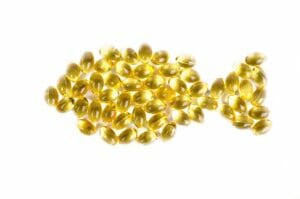Fish oil supplements have become increasingly popular in recent years, with more and more people realizing the benefits of this natural health product. Fish oil is rich in omega-3 fatty acids which are essential nutrients that can promote heart health, reduce inflammation, boost brain function, and support overall well-being. However, determining the right dosage of fish oil can be a daunting task for many consumers. In this article, we will explore the recommended daily intake of fish oil (omega-3) to help you maintain optimal health and wellness without overdoing it or falling short on necessary nutrient intake.
Understanding Omega-3 Fatty Acids: EPA and DHA
Omega-3 fatty acids are essential nutrients that cannot be produced in the body, and must therefore be obtained through dietary intake. Two of the most important types of omega-3s are eicosapentaenoic acid (EPA) and docosahexaenoic acid (DHA), which are found primarily in fatty fish such as salmon, tuna, and mackerel. EPA is known for its anti-inflammatory properties and can help reduce the risk of heart disease by lowering triglycerides and blood pressure.

DHA is critical for brain function, especially during fetal development and early childhood.
In addition to promoting cognitive health, consuming adequate amounts of both EPA and DHA may also benefit vision, joint mobility, skin health, mood regulation, and more.
It is recommended that adults consume at least 250-500 milligrams per day of combined EPA+DHA from dietary sources or supplements.
According to most research studies investigating their effects on various health outcomes, higher doses (upwards of 1000 – 2000 milligrams per day or more) may provide additional benefits in specific populations such as those with high levels of inflammation or certain medical conditions such as cardiovascular disease.
It’s important to note that excessive intake beyond this range can increase risks for bleeding issues over time due to changes in platelet function – it’s best to consult with a healthcare practitioner before supplementing long-term at these higher dosages
Factors That Affect Recommended Dosage: Age, Weight, and Health Conditions
The recommended dosage of fish oil can vary based on several factors, including age, weight, and health conditions. For instance, children may require lower doses than adults due to their smaller size and developmental stage. Similarly, individuals who are overweight or obese may need higher doses to achieve the same benefits as those with a healthier body weight.
In addition, certain health conditions can impact the amount of fish oil that is safe and effective for an individual to consume. People with bleeding disorders or those taking blood-thinning medications should be cautious about taking high doses of omega-3s as they can increase the risk of bleeding. Likewise, those with liver disease should avoid excessive amounts of fish oil as it could worsen their condition.
Overall, determining the appropriate dosage of fish oil requires careful consideration of individual factors such as age, weight, and health status in order to optimize both safety and efficacy. Consulting with a healthcare provider or nutritionist is recommended before starting any new supplementation regimen.
Fish Oil Dosage for Cardiovascular Health: How Much Should You Take?
Fish oil supplements have become a popular aid for promoting cardiovascular health and reducing the risk of heart disease. Omega-3 fatty acids found in fish oil are known to lower triglycerides, decrease inflammation, and reduce blood clotting. However, determining the correct dosage can be challenging as it depends on various factors such as age, gender, weight, existing medical conditions, and individual response to fish oil supplements.
For healthy adults seeking general cardiovascular benefits from fish oil intake, experts recommend a daily dosage of 500-1000mg of EPA/DHA (combined). In case you are taking prescription medicines or dietary supplements that contain omega-3 already advised by your physician then it is recommended not to exceed 3000 mg/day with these products. It’s essential always to consult with a healthcare provider before beginning any new supplement regimen. They can help determine your required dose based on your medical history and other factors unique to you.
Ultimately the right amount of fish oil consumption varies between individuals depending on specific needs or symptoms. Research suggests several beneficial effects such as improving joint mobility among elderly people consuming increased amounts or improved mental health through addressing depression if enough amounts consumed regularly over time under inspection from their doctors alongside additional medicine where necessary highlighting an ongoing discussion about how much-for-whom?
Fish Oil Dosage for Brain Health: Can Omega-3s Boost Your Mood and Memory?
Fish oil supplements are commonly used to improve brain health, and research has found that omega-3 fatty acids can boost mood and memory. The recommended daily intake of fish oil for adults is 1-6 grams per day, depending on their specific needs and goals. For the average healthy adult, a dose of 250-500 milligrams of combined EPA and DHA (the two main types of omega-3s) per day is sufficient.
 It’s important to note that while fish oil capsules are generally safe to take in these amounts, consuming high doses could cause side effects such as stomach upset or bleeding problems.
It’s important to note that while fish oil capsules are generally safe to take in these amounts, consuming high doses could cause side effects such as stomach upset or bleeding problems.
Additionally, some people may experience interactions with certain medications.
Before adding fish oil supplements to your routine or adjusting your dosage, it’s always best to consult with a healthcare professional who can advise you based on your individual needs and medical history.
Fish Oil Dosage for Inflammation: How Omega-3s Can Help Ease Joint Pain
Fish oil supplements are known to be effective in reducing inflammation, especially joint pain caused by conditions like arthritis. Omega-3 fatty acids present in fish oil have anti-inflammatory properties that can help reduce swelling and stiffness in the joints. However, taking excessive amounts of fish oil can lead to side effects such as digestive problems, an increased risk of bleeding or bruising, and a weakened immune system. Therefore, it’s important to follow the recommended daily intake for fish oil.
The American Heart Association recommends consuming at least two servings of oily fish per week or taking 1000 mg EPA/DHA (omega-3) supplements daily for adults with cardiovascular disease. For those without specific health concerns but looking to improve overall health and wellness, a lower dose of 250-500mg EPA/DHA per day is recommended. It’s best to consult with a healthcare provider before starting any supplement regimen since they can provide personalized guidance on appropriate dosage based on individual needs and medical history.

Fish Oil Dosage for Pregnancy and Breastfeeding: Benefits and Risks
During pregnancy and breastfeeding, fish oil supplements are often recommended to support optimal fetal development and delivery. Omega-3 fatty acids found in fish oil are essential for the development of the brain, eyes, and nervous system. Studies have shown that supplementing with fish oil during pregnancy can reduce the risk of premature birth, low birth weight, and postpartum depression.
Although many benefits have been associated with taking fish oil supplements during pregnancy or breastfeeding, there are also risks to consider. High doses of omega-3s may result in unwanted side effects such as bleeding or blood thinning which could be problematic during labor or surgery. It’s important to consult a healthcare provider before beginning any supplementation regimen. A daily dose between 200 mg – 1g may be suitable for most individuals but dosage recommendations will vary depending on individual factors such as diet choices or medical history so it is best to get personalized advice from a healthcare provider when considering whether fish oil may be appropriate for you during your pregnancy journey.
Choosing the Right Fish Oil Supplement: Quality, Purity, and Dose Recommendation
When choosing a fish oil supplement, it is crucial to prioritize quality and purity. Ensure that the product you are considering undergoes third-party testing for heavy metals, contaminants, and other impurities. Look for supplements derived from wild-caught fish species rather than farmed varieties as they tend to contain higher amounts of omega-3 fatty acids.
Dose recommendation is also an essential factor in selecting a fish oil supplement. The general consensus among health professionals suggests a daily intake of 250 – 500 mg of EPA/DHA (the two major omega-3s found in fish oil). If you suffer from heart disease or inflammation-related conditions such as arthritis, higher doses may be required under medical supervision.
Overall, using reputable brands with good manufacturing practices can help guarantee both efficacy and safety when consuming this popular dietary supplement. Consult your healthcare provider before adding any new supplements to your diet, especially if you take medication or have underlying health issues.

Conclusion:
The recommended daily intake of omega-3 varies depending on age, health status, and specific dietary habits.
Generally, for adults, taking 250-500 mg combined EPA and DHA per day is often sufficient to maintain overall health.
For those with specific health conditions, the dosage might be higher, up to 2000mg of EPA and DHA each day.
Omega-3 needs can also be met through diet, with fatty fish being an excellent source of EPA and DHA.
The American Heart Association recommends eating fatty fish at least twice per week, with each serving providing approximately 500mg of long-chain omega-3 polyunsaturated fatty acids.
Krill oil, cod liver oil, and other sources of omega-3 fatty acids may also contribute to your daily intake. Pregnant women, in particular, are advised to increase their omega-3 intake to support fetal development, with a recommendation of 200-300mg of DHA per day.
It’s crucial to balance omega-3 with omega-6 fatty acids, as an excess of omega-6 can inhibit the health benefits of omega-3. Measuring your omega-3 index, a measure of omega-3 levels in your red blood cells, can help ensure you’re getting enough of this essential fatty acid.
When using omega-3 supplements, always refer to the product’s dosage guide and be mindful not to take too much. High doses of omega-3 could lead to side effects and should only be taken under medical supervision. Lastly, it’s important to note that the benefits of omega-3 fatty acids for the primary prevention of any chronic disease are not fully established, and the use of omega-3 should complement, not replace, a balanced diet.
Fish Oil (Omega-3) Dosage – Recommended Daily Intake FAQ
Q: How much omega-3 per day should I take?
A: The recommended dosage of omega-3 per day is 250-500mg of EPA and DHA combined. This can be achieved through consuming fatty fish or taking an omega-3 supplement.
Q: What is the omega-3 dosage for pregnant women?
A: Pregnant women are recommended to consume 200-300mg of DHA per day to support fetal brain and eye development.
Q: What is an essential fatty acid?
A: Essential fatty acids are healthy fats that the body cannot produce on its own and must be obtained through diet or supplements. Omega-3 is an essential fatty acid.
Q: Can I take krill oil instead of fish oil?
A: Yes, krill oil is a source of omega-3 and can be used as an alternative to fish oil.
Q: How many servings of fish should I eat per week?
A: The American Heart Association recommends consuming at least two servings of fatty fish per week to meet omega-3 needs.
Q: What types of omega-3 are there?
A: There are three types of omega-3: EPA (eicosapentaenoic acid), DHA (docosahexaenoic acid), and ALA (alpha-linolenic acid). EPA and DHA are found in fish and seafood, while ALA is found in plant sources such as flaxseeds and chia seeds.
Q: Are there any side effects of omega-3 supplements?
A: Consuming high doses of omega-3 supplements may increase the risk of bleeding and interact with certain medications. It is important to speak with a healthcare provider before taking omega-3 supplements.
Q: How much omega-6 should I consume compared to omega-3?
A: The ideal ratio of omega-6 to omega-3 is 4:1 or lower. However, the typical Western diet tends to have a much higher ratio of omega-6 to omega-3.
Q: What are the benefits of omega-3?
A: Omega-3 fatty acids may reduce inflammation, improve heart health, support brain function, and reduce the risk of certain chronic diseases such as arthritis and cancer.
Q: What are some sources of omega-3 fatty acids?
A: Fatty fish such as salmon, tuna, and sardines are good sources of omega-3. Other sources include chia seeds, flaxseeds, walnuts, and soy products. Cod liver oil is also a popular supplement.



 Fish Oil (Omega-3) Supplements for Pregnancy and Fetal Development
Fish Oil (Omega-3) Supplements for Pregnancy and Fetal Development
